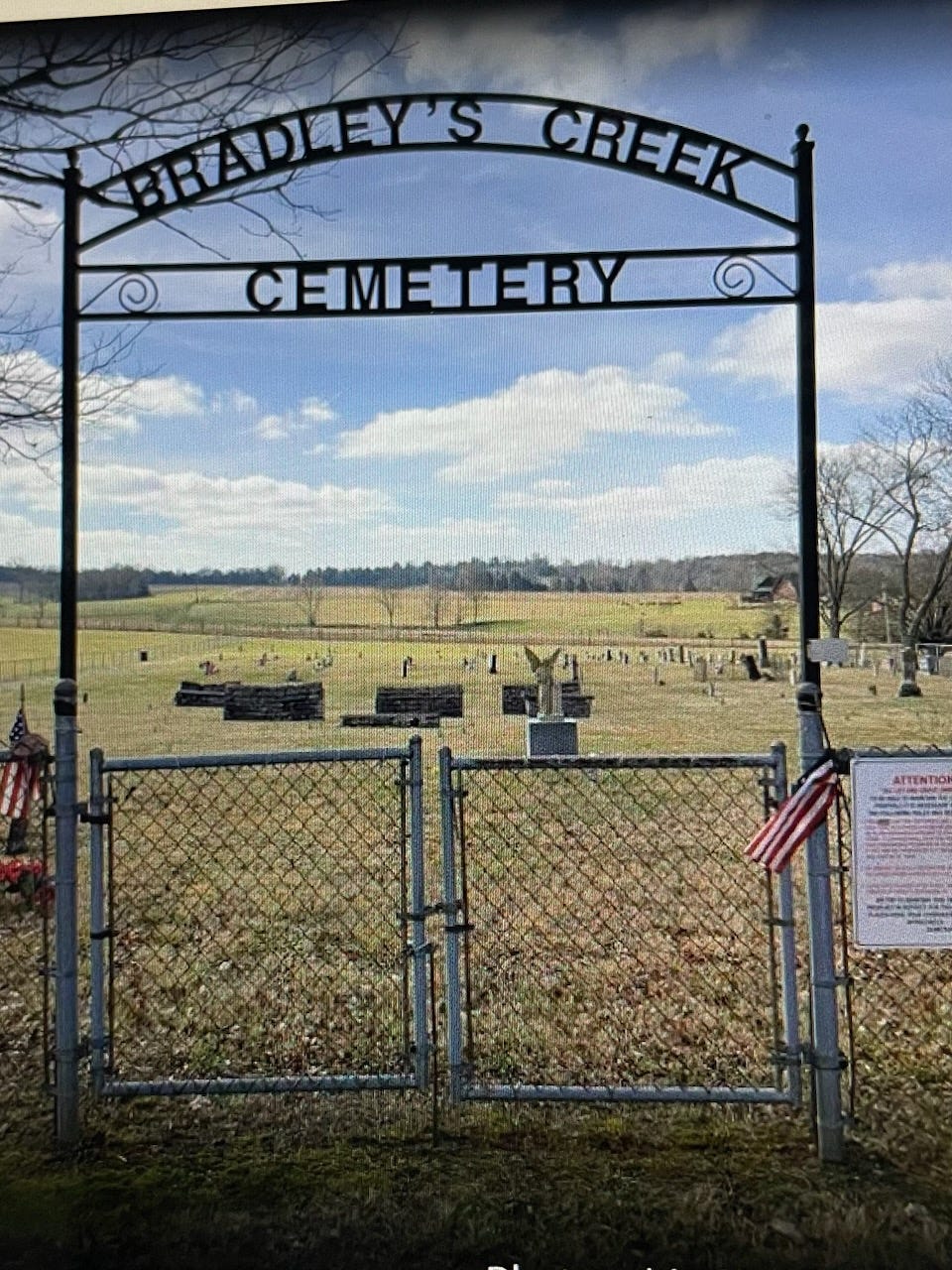You Have to Know Your People: Mr. Craddock
And your places (Bradley's Creek) and your songs (Uncloudy Day)
A buddy of mine says that for any story to be a real story—and especially for Southerners—it has feature your people and your places.
We have to know our places: that tree, the creek, the field, the old home place, my “birth church,” where I proposed… the specific places that shaped our awareness and still give contour to our memories.
And we have to know our people: not just our kin, but other “up close” folk—coaches, teachers, mentors, preachers, bosses—and even heroes we’ve never met, who had (and have) a powerful influence on us, one way or the other.
Dr. King might be one such hero, or Mickey Mantle. Frederick Buechner or John Denver.
My buddy said nothing about real stories needing to reference “our songs,” but for me it’s almost impossible not to feature a song.
Over the next few substacks I am going to tell some of my real stories, featuring my real places and real people (and, yes, some songs, too).
Today’s concerns Bradley’s Creek, a little Baptist church, in a little town (Milton, TN) where my little Daddy preached for a little while (about a year) on two different occasions.
The church, now, is over 200 years old. As MTSU (and Murfreesboro) expands, it encroaches: only fifteen minutes from historic church to modern university. Back in the day, we traveled half-a-world past nowhere and fifty years back in time to get there.
In any case, Bradley’s Creek is one of my real places. I see it in my mind. I visit it sometimes in my dreams: a beautifully cared-for white sided building with two front doors, one for women, one for men. I made pilgrimage some years ago and just spent some time in the sanctuary and across the road in the cemetery where the church’s people are buried.
During his brief tenures, Dad led the singing, too, and on Sunday nights regularly invited us to call out our favorite hymns. (Marie Givens played piano; I had such a crush on her. I was about 8. She was 25 and engaged.)
Unsurprisingly, we invariably chose the songs of heaven. Life was hard, times were harder. Hell was hot, Dad said. Heaven was sweet and our only hope.
I always sat next to Mr. Craddock, an arthritic old saint in a black wool suit even on hot summer days—a widower who was as gnarled as an old dogwood. But when we sang, “Oh, they tell me of a home far beyond the skies…” I would see Mr. Craddock begin to move a little. I always suspected he had some “holiness” in his soul.
Oh, they tell me of a home far away.
Yes, they tell me of a home where no storm clouds rise,
Oh, they tell me of an unclouded day.
By the time we got to verse four, Mr. Craddock was feeling it, I mean.
Oh, they tell me that he smiles on his children there
and His smile drives their sorrows all away;
and they tell me that no tears ever come again
In that lovely land of unclouded day.
By the final chorus Mr. Craddock would have grabbed his bald head with hands that looked as if they were stuffed with marbles, and be rocking like a rabbi at the Western Wall.
His anticipation has remained my aspiration: his hope of heaven a defiant ally in my war against fear—whether the fear of hell, or the fear of God (or my fear of Dad), which, really, are all the same fear.
I am not so much afraid anymore because Mr. Craddock began to show me a love for God that could cast out all fear, and leaves in its place a God-shaped hole that only heaven can fill. I began to love heaven at Bradley’s Creek, when I was just a boy; but now, getting on toward Mr. Craddock’s age, I long for it ever more deeply.
Much, much later—after “many dangers, toils and snares,” as John Newton described it, I learned that John Wesley had written,
“I want to know one thing— the way to heaven; how to land safe on that happy shore. God himself has condescended to teach the way: For this very end he came from heaven. He hath written it down in a book. O give me that book! At any price, give me the book of God!”
When I came across that passage, I experienced something like the communion of the saints. I earnestly desired to be gathered to them there—safe on that happy shore with Mr. Wesley, Dad, Mr. Craddock and his wife Mary Rosa, John Newton, Mr. Alwood (who write Unclouded Day)— with all the saints who perhaps had feared, but feared no longer. Who had known dangers, toils and snares, but were now in the arms of Jesus…where I still hope to be.
And with Jesus, whose smile will drive our fears, as well as our sorrows, all away.
Till then—I can almost hear Mr. Craddock sing it—
Let us then be true and faithful, hoping, trusting every day.
Just one glimpse of him in glory with the toils of life repay. (Eliza Hewitt, When We All Get to Heaven)
How do we stay true and faithful?
As Fr. John Shea has suggested: by Gathering the people. By Breaking the Bread. And by Telling our stories.
And, by Singing our songs.







I must be a good Southerner. I enjoyed the warmth of your remembrance this morning and will look forward to your upcoming ones.